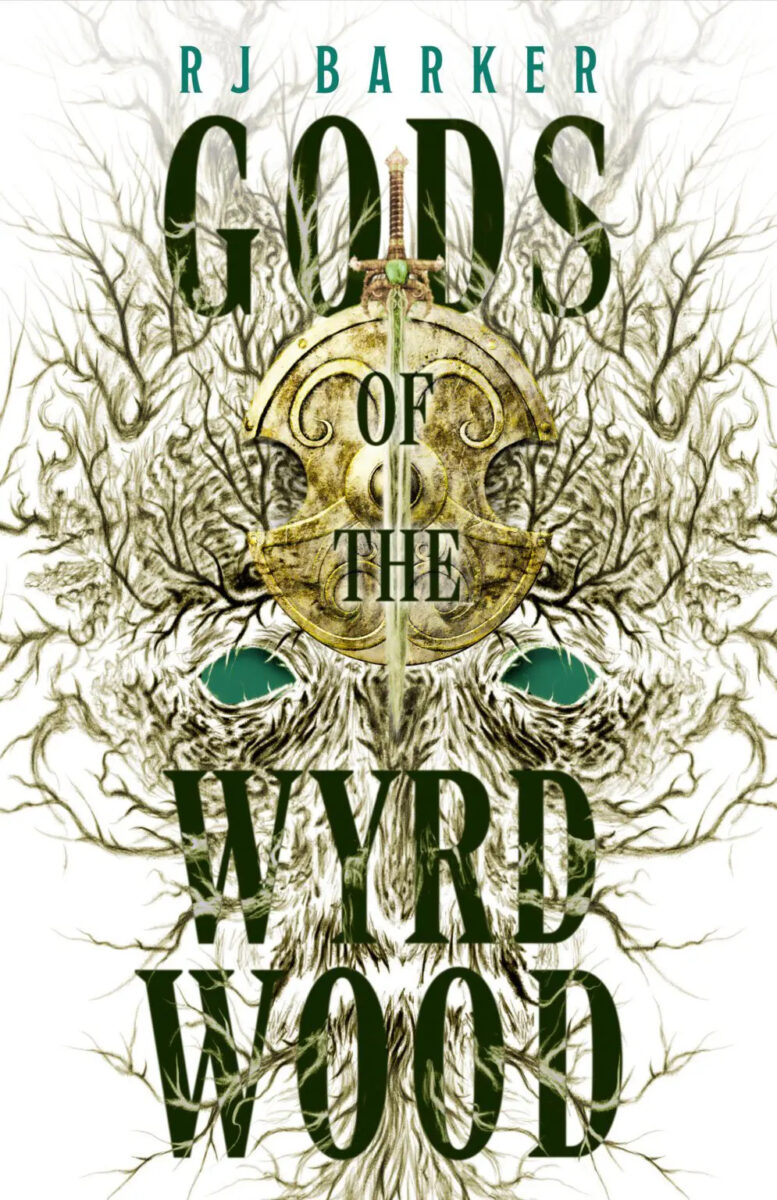It feels often, in fantasy, magic is a blessing. It’s not the magic that makes the arch-typical, the top of the mountain, evil but in how they decide to use it. Not as we know it, Gods of the Wyrdwood by R.J. Barker. In the north of Crua, the land is locked in eternal winter, but if the Cowl-Rai, those chosen ones representing the gods to bond with a cowl, win a war against the Old Cowl-Rai of the south, they’ll bring warmth back to their lands. For a time, Cahan Du-Nahere was taken from his family and raised to be the true Cowl-Rai who would accomplish this deed, but destiny had other plans.
We find Cahan Du-Nahere at thirty years of age, with no clan, no family, and someone else from the local village, Harn, having given away his family farm to someone else. Cahan has grown up bitter, isolated, and unwilling to deal with or help people unless he can get something in return. He is a cynic and not without good cause. He has also earned the name of forester because he has grown to understand the forest, an ecosystem beyond most people’s understanding, not a forest as we know it but a place with creatures, monsters, and perhaps even gods that people have grown to fear. Cahan wants to be left alone, yet the one thing no one wants to do is precisely that.
Gods of the Wyrdwood feels cruel without falling into the traps of the worst grimdark fantasy. In Crua, to be clanless is to be a second-class citizen. Still, everyone feels like second-class citizens to the Rai, being bound to the cowl and feeding it, making them bigger, stronger, and more powerful than everyone else, on top of the privilege of being given the best of everything. As it is introduced, the cowl is inherently cruel, requiring those who use it to drain the life force of others to become more powerful. The author asks the question, is it the cowl that causes the Rai to be cruel, are the people chosen to become Rai always had the cruelty in them, or have they killed to gain more power for so long they dare not find any other way? We read these brutal ambitions through Kirven, the High Leoric of Crua, tasked with making sure each of these so-called false Cowl-Rai is eliminated. She feels like the direct result of what Crua has become. While Cahan is on the outside, Kirven is entrenched in it, seeking to increase her power and the means to hold on to it even if it means treating her son, a potentially new Rai, with the brutality the Rai treats everyone else with.
As a protagonist, Cahan is not necessarily a hero of any kind, even though he was once chosen to be Cowl-Rai. He is balanced well between being cynical and being realistic. You get the sense he has had to become this way to survive, that there was someone more idealistic inside him before he became the forester. Cahan is like the forest from which he gets his title. Crua society is like the Rai: cruel, cynical, and selfish. Cahan is more like the forest, matter of fact, pragmatic and doing what must be done to survive. In the hands of a lesser author, a character such as Cahan could be too abrasive, but there is just enough of a crack in the hard shell he has grown to protect himself as to want to continue his journey with him, seeing if that crack will grow larger.

It wouldn’t be called Gods of the Wyrdwood without gods, yet the Cowl-Rai that rose in power in Cahan’s stead has made it their mission to stamp out any and all Cowl-Rai of other gods so only Tarl-an-Gig remains. However, the old gods and old ways that go with them feel like Chekhov’s Gods are bound to make a comeback in some fashion directly linked to the forest. When Cahan ventures into it, the forest reads like the other side of the coin to Cowl-Rai-controlled Crua. The forest does not care if you are a good or bad person when you tread upon it. It only matters that you are there. It has its own rules, less cruel but just as brutal, where knowledge of the forest is power and the survival of the fittest matters most.
The book can feel dire, but it is not without hope, and much of it comes from the High Leoric’s child, the trion Venn. Trion are the third gender of the world, described as being between man and woman with a greater understanding of the world and believed if one should become Cowl-Rai will have tremendous power that could make or break Crua. As a result, they are treated with both reverence and fear, forced to endure grievous trials to unlock that power. The youth, chosen to become a Cowl-Rai, to become bound to the cowl, and to kill to gain its power, seems to be the only one asking why Crua is the way it is and why the cowl must only be powered by cruelty. Upon meeting Cahan, they begin to instill the same questioning with the unchanging forester, cracking that hard shell he has built around himself to survive. It’d be expected for R.J. Barker to have this result in Cahan changing who he is and to be the turning point for significant change in Crua. Still, the better path has not come so easily. Nothing positive in Gods of the Wyrdwood by R.J. Barker comes easily, but the fact that hope comes at all is worth the read.
Check out No Page Unturned, a book podcast featuring this reviewer on the Geeklyinc network
Joshua was provided an advance copy of the book by Orbit Books.
If you liked this review, please consider buying the reviewer a coffee.
Follow Joshua MacDougall @FourofFiveWits on Twitter.
